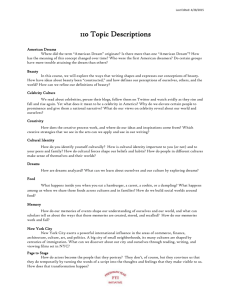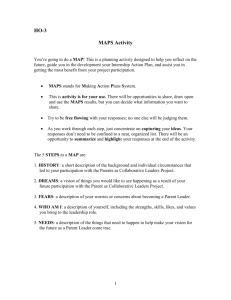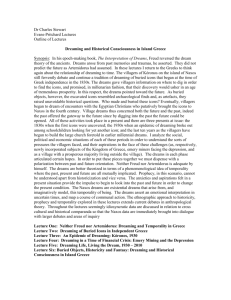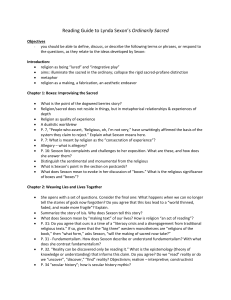Handout
advertisement
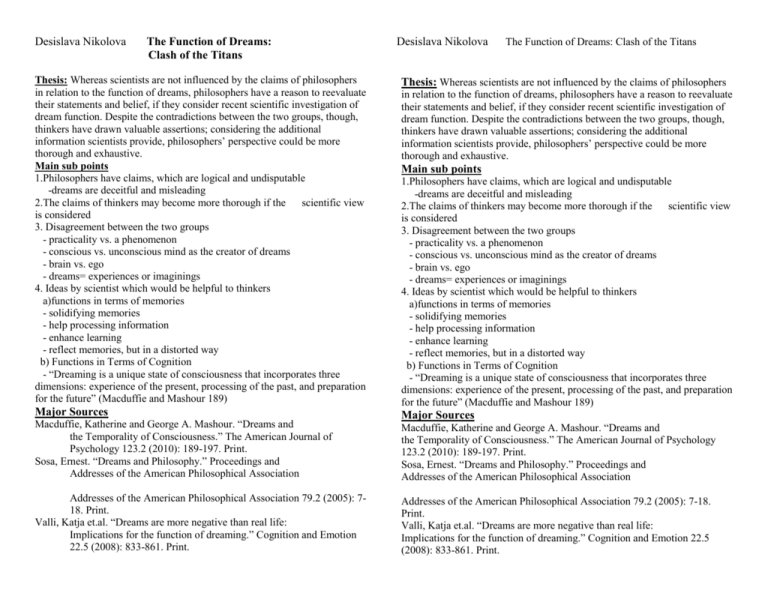
Desislava Nikolova The Function of Dreams: Clash of the Titans Desislava Nikolova The Function of Dreams: Clash of the Titans Thesis: Whereas scientists are not influenced by the claims of philosophers in relation to the function of dreams, philosophers have a reason to reevaluate their statements and belief, if they consider recent scientific investigation of dream function. Despite the contradictions between the two groups, though, thinkers have drawn valuable assertions; considering the additional information scientists provide, philosophers’ perspective could be more thorough and exhaustive. Main sub points 1.Philosophers have claims, which are logical and undisputable -dreams are deceitful and misleading 2.The claims of thinkers may become more thorough if the scientific view is considered 3. Disagreement between the two groups - practicality vs. a phenomenon - conscious vs. unconscious mind as the creator of dreams - brain vs. ego - dreams= experiences or imaginings 4. Ideas by scientist which would be helpful to thinkers a)functions in terms of memories - solidifying memories - help processing information - enhance learning - reflect memories, but in a distorted way b) Functions in Terms of Cognition - “Dreaming is a unique state of consciousness that incorporates three dimensions: experience of the present, processing of the past, and preparation for the future” (Macduffie and Mashour 189) Thesis: Whereas scientists are not influenced by the claims of philosophers Major Sources Major Sources Macduffie, Katherine and George A. Mashour. “Dreams and the Temporality of Consciousness.” The American Journal of Psychology 123.2 (2010): 189-197. Print. Sosa, Ernest. “Dreams and Philosophy.” Proceedings and Addresses of the American Philosophical Association Addresses of the American Philosophical Association 79.2 (2005): 718. Print. Valli, Katja et.al. “Dreams are more negative than real life: Implications for the function of dreaming.” Cognition and Emotion 22.5 (2008): 833-861. Print. in relation to the function of dreams, philosophers have a reason to reevaluate their statements and belief, if they consider recent scientific investigation of dream function. Despite the contradictions between the two groups, though, thinkers have drawn valuable assertions; considering the additional information scientists provide, philosophers’ perspective could be more thorough and exhaustive. Main sub points 1.Philosophers have claims, which are logical and undisputable -dreams are deceitful and misleading 2.The claims of thinkers may become more thorough if the scientific view is considered 3. Disagreement between the two groups - practicality vs. a phenomenon - conscious vs. unconscious mind as the creator of dreams - brain vs. ego - dreams= experiences or imaginings 4. Ideas by scientist which would be helpful to thinkers a)functions in terms of memories - solidifying memories - help processing information - enhance learning - reflect memories, but in a distorted way b) Functions in Terms of Cognition - “Dreaming is a unique state of consciousness that incorporates three dimensions: experience of the present, processing of the past, and preparation for the future” (Macduffie and Mashour 189) Macduffie, Katherine and George A. Mashour. “Dreams and the Temporality of Consciousness.” The American Journal of Psychology 123.2 (2010): 189-197. Print. Sosa, Ernest. “Dreams and Philosophy.” Proceedings and Addresses of the American Philosophical Association Addresses of the American Philosophical Association 79.2 (2005): 7-18. Print. Valli, Katja et.al. “Dreams are more negative than real life: Implications for the function of dreaming.” Cognition and Emotion 22.5 (2008): 833-861. Print. Desislava Nikolova The Function of Dreams: Clash of the Titans Desislava Nikolova The Function of Dreams: Clash of the Titans



